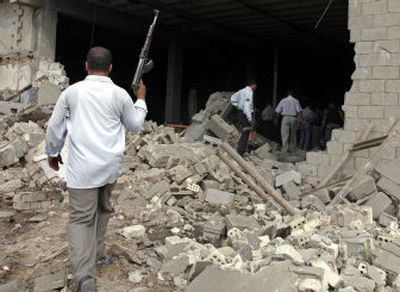Car bombs leave 16 dead in continuing Iraq violence

BAGHDAD, Iraq – Car bombs killed at least 16 people and injured dozens Sunday in Baghdad and a Shiite holy city, casting doubt on U.S. hopes that formation of a new government would quickly end the country’s violence.
At least 26 others were killed or found dead Sunday, including a U.S. Marine mortally wounded in Anbar province in western Iraq, police and the U.S. military said.
Some victims appeared to have been abducted and killed by sectarian “death squads” that target members of rival religious communities. The dead included three brothers whose charred bodies were found before dawn in Baghdad’s Dora district, a mixed Sunni-Shiite area and one of the city’s most violent.
The deadliest attack occurred at midmorning when a suicide driver detonated his vehicle near an Iraqi army patrol leaving its base in the Sunni Arab neighborhood of Azamiyah, killing 10 people and injuring 15, most of them Iraqi soldiers, police Lt. Col. Falah al-Mohammedawi said.
A half-hour earlier, a car bomb exploded near the Baghdad offices of the state-run al-Sabah newspaper, killing an employee, police Lt. Ahmed Mohammed Ali said. Officials believed the target was a police patrol that passed shortly before the blast.
In Karbala, a Shiite holy city 60 miles south of Baghdad, a suicide car bomber exploded his vehicle near the main provincial government building, killing five people and wounding 19, police spokesman Rahman Mishawi said.
U.S. officials have long contended that violence would subside if Shiites, Sunnis and Kurds believed they had a stake in a new unity government representing all the nation’s religious and ethnic communities.
The framework of Iraq’s government was put in place last month. Incoming Prime Minister Nouri al-Maliki, a Shiite, hopes to present his Cabinet to parliament by Wednesday.
However, a top Shiite official said al-Maliki would probably not meet that target because of differences among the parties over who will run the ministries of interior and defense.
Those posts control the police and army, and U.S. and British officials have insisted that the new ministers have no ties to militias believed responsible for kidnappings and killings of civilians.
Sectarian violence has forced about 14,700 Iraqi families – or about 88,000 people – to flee their homes, a senior Iraqi official said Sunday. The official, Suhaila Abed Jaafar, doubted they could return without “concerted military action” to restore order in their communities.
“The solution is in the hands of the interior and defense ministries,” Jaafar, the minister responsible for caring for displaced Iraqis, said.
In London, the British Defense Ministry said “up to five” British personnel had been killed in Saturday’s helicopter crash in Basra. British officials have not confirmed Iraqi police and witness reports that the Lynx helicopter was shot down.
Basra, Iraq’s second-largest city, was calm Sunday after a day of violence when about 250 Iraqis cheered wildly, hurled stones and fired gunshots at British troops who had rushed to the crash scene. Five Iraqis, including a child, were killed in the melee, and several British troops were slightly injured.
In a bid to ease tension, Basra Gov. Mohammed al-Waeli agreed Sunday to resume cooperation with British authorities, which he broke off four months ago after British troops cracked down on policemen with links to Shiite militias.